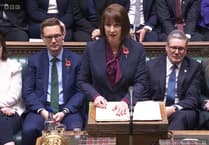A Devon MP has called for more support for local farmers in the wake of the chancellor’s recent budget.
Chancellor Rachel Reeves announced changes in inheritance tax which many farmers claim will create serious problems in the industry. The cost of handing down agricultural property through families will increase for farming couples with more than £3 million in assets, and some fear that farms will have to be broken up and sold as a result.
South Devon MP Caroline Voaden urged the government to abandon the proposed “tractor tax”, which she claims could see up to 27 per cent of farms being forced to pay a higher rate of inheritance tax.
Under the budget proposals, on their death farmers will pay 20 per cent of the value of agricultural property worth more than £1 million, or £2 million if they are married or in a civil partnership.
The standard rate of inheritance tax is 40 per cent.
Ms Voaden also believes the lack of discussion around social care is a ‘gaping hole’ in the budget, with concerns in Devon about the lack of tax relief for hospitality, leisure, and tourism businesses.
Rates relief offered to companies in these sectors will drop from 75 per cent to 40 per cent, which Ms Voaden said would increase the burden on small and medium-sized businesses.
She said they are “the engines of our economy and the lifeblood of our communities.”
Speaking in the House of Commons, she said: “There is no doubt the government inherited an economic mess and had some tough decisions to make. But, despite this, I’m disappointed there was no mention of the word ‘dentist’ in the chancellor’s speech last week and that there is no renegotiation of the NHS dentistry contract in sight.
“The lack of discussion around social care is also a gaping hole. Liberal Democrats have been calling loudly for a cross-party conversation on social care and we estimate the introduction of free personal care could deliver annual savings to the NHS of up to £3.3 billion by 2031.
“It was distressing to hear local care providers, already stretched to breaking point, saying this weekend that the additional employers’ National Insurance they’ll have to pay could signal the death knell for some employers.”




